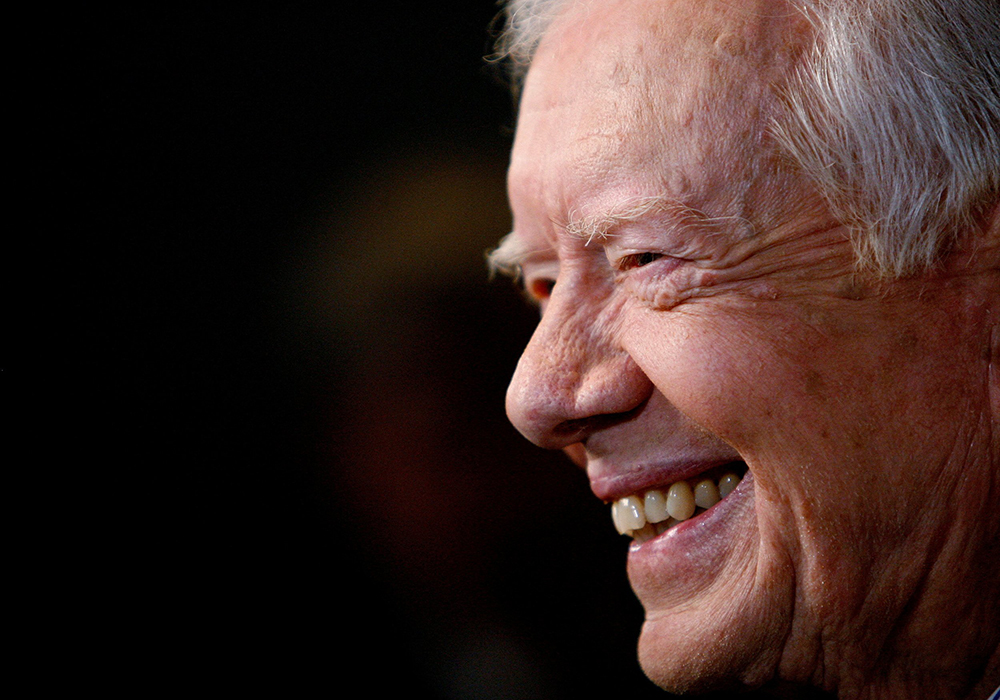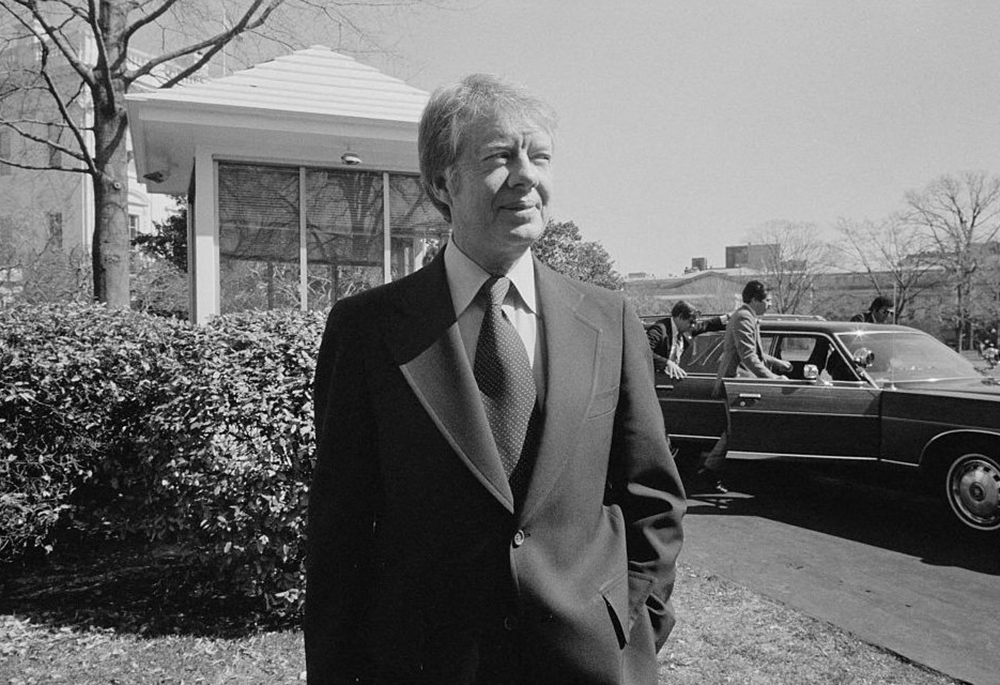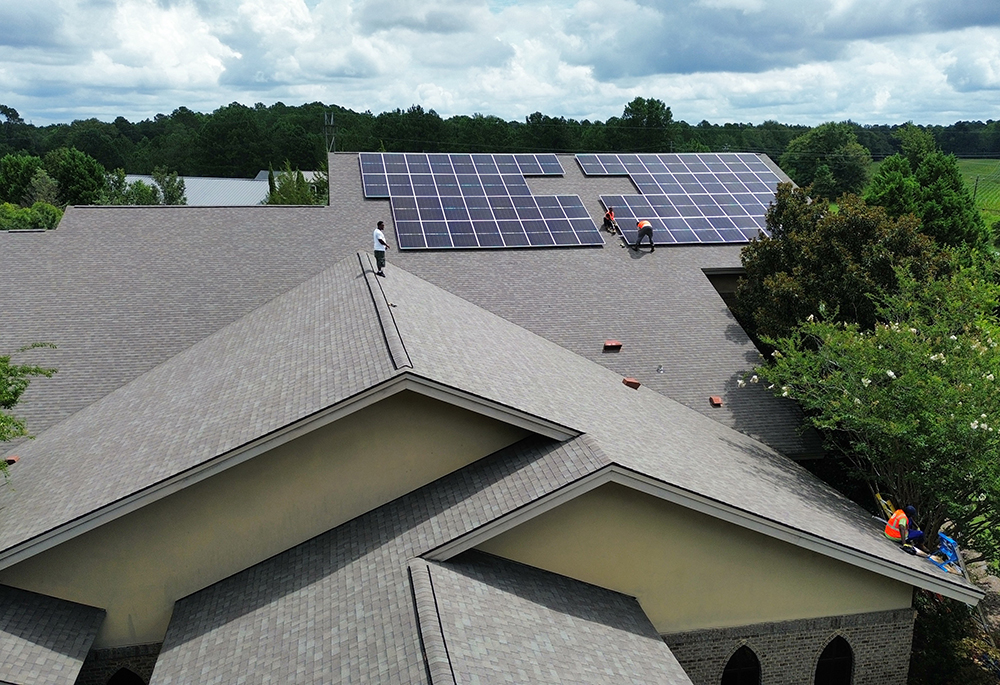
Former U.S. President Jimmy Carter smiles at the premiere of "Jimmy Carter: Man From Plains" at the Elgin theatre during the 32nd Toronto International Film Festival in Toronto, Canada, Sept. 10, 2007. Carter died Dec. 29, 2024, at 100, at his home in Plains, Georgia. (OSV News/Reuters/Mario Anzuoni)
With the passing of former President Jimmy Carter on Dec. 29, 2024, Georgia, the United States and the world lost the first evangelical environmental president.
Born in Plains, Georgia, in 1924, Carter was raised in a devout Southern Baptist household, where faith and service to others were central to daily life. His family attended Maranatha Baptist Church. The values instilled in him through the church — particularly humility, hard work, and stewardship — remained a core part of his identity throughout his life.
In addition to his strong evangelical Christian foundation, Carter developed an early love for science and curiosity about the natural world. After attending local schools in Plains, he was admitted to Georgia Southwestern College and later transferred to the Georgia Institute of Technology to strengthen his academic foundation. He then received entry to the prestigious United States Naval Academy in Annapolis, where he excelled in math, physics and engineering.
Following his graduation in 1946, Carter began a career as a naval officer, specializing in nuclear engineering. Rather than seeing faith and science as incompatible, Carter embraced both, believing that God created humanity with the capacity for reason and growth.
"I don't see now, and have never seen, any incompatibility between the truth as has been proven through scientific discoveries," said former President Carter in a 1999 interview with Bob Abernethy. "I see that as completely compatible with God's creation of the universe."
Together, Carter believed, faith and science could solve global challenges — promoting peace, prosperity and justice for all.
After leaving the Navy, Carter returned to Plains to manage his family's struggling peanut farm following his father's death. This shift from naval officer to rural farmer was drastic, but Carter approached it with the same discipline, faith and innovation as he approached everything else. Under his leadership, the farm thrived, and Carter became a respected community leader.
Advertisement
In 1962, Carter entered politics, running for a Georgia Senate seat and winning. As a state senator, he advocated for fair representation, government transparency and reforms benefiting rural Georgians, emphasizing that stewardship — whether of land, community, or power — was a moral responsibility.
Becoming governor in 1971, Carter advanced significant environmental protections. One of his hallmark achievements was the 1972 Georgia Heritage Trust Program, aimed at preserving the state's natural landscapes and historic sites, particularly along the vulnerable coastline. He believed economic growth and environmental protection could coexist when grounded in faithful care of God's creation.
When Carter became president in 1977, he carried this same commitment to faithful environmental action to the national stage. His administration saw some of the most ambitious environmental achievements in U.S. history. A landmark accomplishment was the Alaska National Interest Lands Conservation Act in 1980, which protected more than 157 million acres of Alaskan wilderness, creating national parks, wildlife refuges and forests.

Then-President Jimmy Carter poses at the White House in Washington March 8, 1977. Carter died Dec. 29, 2024, at 100, at his home in Plains, Georgia. (OSV News/Marion S. Trikosko, Library of Congress via Reuters)
Carter also championed the transition to renewable energy and energy conservation as a moral imperative. In 1977, he created the Department of Energy, consolidating federal energy programs to address the nation's energy crisis and reduce dependence on fossil fuels. He emphasized the importance of sustainable solutions, encouraging Americans to adopt energy-saving measures at home. Carter led by example, famously installing solar panels on the White House — an unprecedented gesture that demonstrated his belief in innovation and the role of the individual in building a greener future.
Despite political resistance and a challenging economic landscape, Carter's environmental policies were ahead of their time. He viewed sustainability as a moral calling, rooted in a deep respect for the interconnectedness of creation.
Where many saw absolutism, Carter brought spiritual curiosity. He was willing to take risks and make leaps of faith. As Christian theologian Paul Tillich wrote, "Doubt isn't the opposite of faith; it is an element of faith."
For Carter, faith was not ignorant and detached from reason. It involved questioning and learning—deepening one's relationship with their neighbor and Creator. It acknowledged the limits of human understanding and trusted the unknown to a known God.
During his presidency, Carter was continuously challenged by those who held that faith was something separate from science. Humanity often prefers the structures we build over the complexities of the natural world. Our creations offer predictability and certainty, while nature invites us to wrestle with intricate beauty and contradictions. Where monochrome feels manageable, the vivid hues of creation demand awe, care and compromise.

A solar installation is pictured at Trinity Episcopal Church in Statesboro, Georgia, on July 25, 2024. (Courtesy of Sunpath Solar and Georgia Interfaith Power and Light)
This tension contributed to Carter's defeat in 1980. He lost handily to Ronald Reagan, including among southern white evangelicals, despite holding true to his faith. As historian Kristin Kobes Du Mez writes in Jesus and John Wayne:
Carter was supposed to be one of them — he was a born-again evangelical, a southerner, a Sunday school teacher—and they had helped elect him to restore the nation's firm moral footing. ... Yet it was clear that he was not one of them on the issues that mattered most.
He was faithful to God and God's creation. Carter's stewardship-based policies, his preference for diplomacy and his commitment to equity over dominance didn't fit the growing demand for a "strongman" leader.
Though Carter served only one term in the White House, his legacy extends beyond that. Rooted in faith, science and humility, his life serves as a reminder that hope is most resilient when shaped by curiosity, trust and service.
At Georgia Interfaith Power and Light, we see Carter's legacy come to life daily in the hundreds of congregations we work with to protect Georgia's natural resources. These faith communities are reducing waste, saving energy and addressing the impacts of extreme heat and rising sea levels. By embodying Carter's vision of faithful environmental care, they are making the world more livable for all.
Carter's life teaches us that stewardship is not just an environmental practice but a spiritual one. It's an act of hope — rooted in the belief that our work, though imperfect, matters.
As we mourn his passing, let us honor his legacy by continuing the work he championed: fostering resilience, advocating for justice and caring for our Sacred Earth. In Carter's words, "We can choose to alleviate suffering. We can choose to work together for peace. We can make these changes — and we must."





